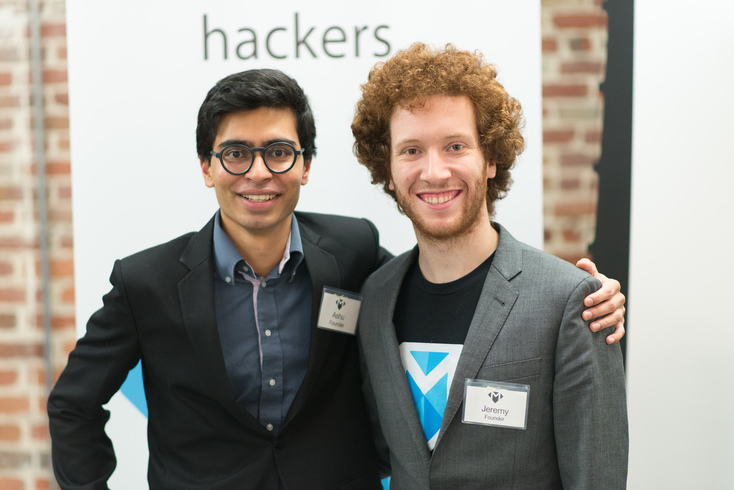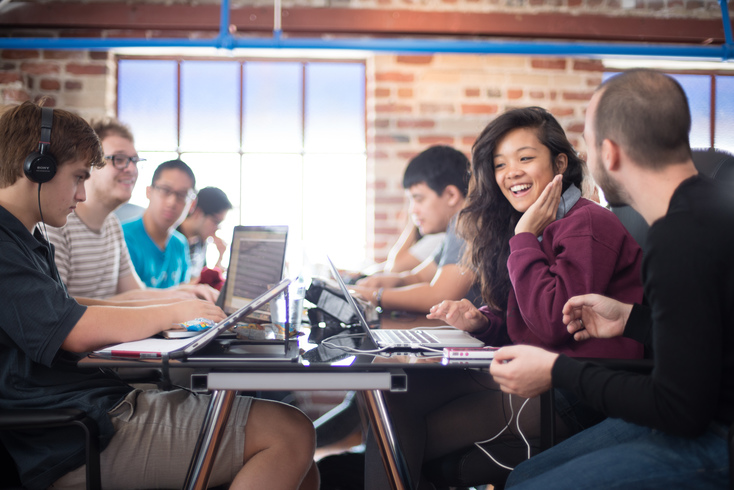Phillip Ou had barely learned to code when he joined Make School’s 2014 summer academy. A year later, after transferring from MIT to become a member of the educational startup’s inaugural two-year “college replacement” class, Ou has published more than half a dozen iOS apps and is currently interning at Snapchat.
Ou is one of 11 students in the midst of spending two years attending Make School, a San Francisco-based educational startup that aims to replace traditional four-year computer science degrees. Cofounded by tech entrepreneurs Ashu Desai and Jeremy Rossmann, with funding from 500 Startups, Andreessen Horowitz, Reddit CEO Alexis Ohanian and Y Combinator, Make School teaches hands-on coding with an agile curriculum that changes yearly to promote the skills tech companies are looking for.
Faced with the decision of continuing his theory-based computer science education at MIT or taking a gap year to attend Make School, Ou decided he wanted to “build stuff.”
“When I got a full ride to MIT, I was the first person in my family to ever go to college,” he said. “As the son of immigrants, they have this path planned out for you. Get your degree, get a good paying job and lead a stable life. What shifted my mindset was this entrepreneurial culture at MIT—people building things because they loved it—and then Make School put me in Silicon Valley for the first time, and I met all these engineers, founders and VCs doing amazing things. It forced me to realize my greatest accomplishment, being a student at MIT, was essentially just a credential. That didn’t sit right with me.”
Make School’s current curriculum includes Python for algorithms and theory, Objective-C and Swift for app development, Flask for app back-end development, Ruby on Rails for Web back-end development, and HTML, CSS, JavaScript and AngularJS for front-end development. All are taught in the context of students coming up with ideas and building on them. The school’s exams are weekly code reviews with instructors going through each student’s app, line by line.
According to Ou, students have the feeling of learning and working in a collaborative startup environment, all while meeting people and making invaluable connections in Silicon Valley.
“I got to sit in on Make School meetings where they talked about things like expanding our demographics and securing our next round of funding,” he said. “We got to do stuff like have dinner with Reddit CEO Alexis Ohanian and pick his brain. It’s pretty incredible. I’ve only been coding for a little more than a year, and right now in this startup I’m doing contract work for, I have full autonomy in building their new Apple Watch app.”
Building Make School
Desai built his first iOS app in high school when the App Store came out. The game, Helicopter, sold more than 60,000 copies and gave him what he described as the most engaging educational experience he’s ever had. It also opened up job and internship opportunities.
Desai studied computer science for a year at UCLA, but said the academic-style learning didn’t really resonate. He wanted to build products. He left UCLA and cofounded MakeGamesWithUs, an app publishing startup focused on teaching high school and college students how to code games. Beginning in 2012 as a summer program, the startup ultimately evolved into Make School.
“All you need to get employed is to know how to build things. Nothing else really matters,” said Desai. “So we started the company to teach high school and college kids how to code apps, and supplement that theoretical computer science they learned in school with the experience of building these real-world technologies, which is what companies really care about anyway.”
(Related: Inside an NYC high school for budding software developers)
Desai and Rossmann began by providing hands-on training and tools for students in the summer program to build consumer-ready apps. But they gradually began to design a new type of learning experience from the ground up. Make School’s most recent summer program included 120 students split among New York, San Francisco and Make School’s home base in Palo Alto, Calif.. The two-year program will welcome its second class this fall, with the school receiving more than 350 applicants for 50 spots.
“A lot of the computer science you learn in college is important, and we do teach that,” said Desai. “However, we’ll teach it through the lens of building real-world projects. Developer friends of ours all echoed that most of what they learned in their CS degrees was not very useful to them. If you’re being dumped information in a lecture, it’s not very interesting. But if you’re told here’s a really cool project you’re going to build, and along the way you’ll learn all these concepts, the engagement is much higher and the student feels a sense of ownership.”
Changing the CS education equation
Make School’s educational model is beginning to gain more traditional academic acceptance. The startup’s curriculum and online courses are now being taught as third-party computer science courses at MIT, Carnegie Mellon and the University of California. Desai explained that at MIT in particular, the Make School class served as a showcase for corporate sponsors looking to recruit professional-ready talent.
“It’s really hard for schools like MIT and Carnegie Mellon to change their curriculum,” said Desai. “There are so many layers of bureaucracy that they can’t adapt as quickly to all the changes in the industry. There’s a massive shortage of talent and no way for colleges to meet this demand. Even if all the colleges were doing a great job at teaching computer science, they still wouldn’t have enough graduates to fill the number of developers we need to meet economic demand.”
Make School’s curriculum is also fluid. The educational model relies on a feedback loop with the software industry where Desai, Rossmann and Make School’s instructors consult tech company CTOs and engineers on what they’re looking for in a prospective hire and integrating that information directly into the curriculum.
“If you’re not turning over the curriculum every year, we think you’re doing something wrong,” said Desai. “At most universities, professors are teaching the same thing year after year. So we need to build in mechanisms for this change to constantly be propagating. Devising curriculum with the awareness that whatever you build and design today will not be relevant in two or three years.”
Instructors in Make School’s summer academy and pilot two-year program are working developers who spend time building their own products, so Desai said they never grow disassociated from the current state of the industry as a college computer science professor might. The curriculum also takes student feedback into account, adding new lectures and topics, and changing teaching styles based on weekly student feedback meetings.
“We envision Make School as the world’s first product university,” said Desai. “Our instructors spend 20% of their time working on products or open-source software, and our students are building software as they’re learning to churn people out into the burgeoning startup ecosystems not just in Silicon Valley but around the world.”
Another interesting aspect of the startup is its tuition model. Back when it was MakeGamesWithUs, the company took a percentage of each game’s App Store revenue. In the shift to Make School, the startup makes a long-term investment in each student.
In a similar vein to Peter Thiel’s fellowship encouraging young entrepreneurs to skip college and start businesses, students pay no yearly tuition for the two-year program. Instead, they repay the startup earnings from the internship Make School helps them get in the middle of the program, along with 25% of their first two years’ salary after graduation. The better job the student ends up with, the better return Make School gets on its investment.
“By having our revenue tied directly with student outcome, we’ve really aligned to this student-first mentality,” said Desai. “Colleges are running into these same problems. They are a business, they need to make money, but the way they make money isn’t actually through students and parents paying them tuition. So for us, if a student graduates and gets a higher-paying job, they’ll pay us more, and even if a student didn’t get a job—which we don’t believe will be the case—they would never owe us money. The skills we’re teaching students are in such high demand that this model is actually feasible.”
Bridging the talent gap
While the inaugural Make School class interns at companies like DailyMotion, Pandora and Snapchat, Make School’s educational model has already proven successful. The startup’s ultimate goal is to train the next generation of startup founders and developers to meet the insatiable talent demand of the software industry, and high school students from the inaugural MakeGamesWithUs summer program are now working and interning at companies like Dropbox, Facebook and Google.
Carole Touma, who attended MakeGamesWithUs in the summer of 2012 and 2013 (along with her brother Paul), recently finished her sophomore year at Princeton and is spending her second straight summer as a software engineering intern at Facebook. Touma’s MakeGamesWithUs experience building an iPhone game, where users try to guess a song’s name as quickly as possible, introduced her to iOS programming and led her right to a Facebook intern program for college freshmen to build an iOS app in eight weeks.
“I wouldn’t have gotten that internship if it wasn’t for MakeGamesWithUs,” said Touma. “It introduced me to iOS programming and how cool computer science can be when it’s not all high-level theory. That summer I built an app called Memory Lane with two other Facebook interns that reduces the hassle of journaling by prompting you with questions about your day and logging events.”
Vacillating between her experiences at MakeGamesWithUs, Facebook and the traditional computer science curriculum at Princeton, Touma said she found both styles of learning helpful. Though after she graduates in 2017, she knows she wants to found a startup.
“Princeton’s courses—first learning Java, then C, then Assembly—were important for me because it’s a structured, bottom-up type of learning, but I prefer the freestyle type of learning more,” said Touma. “When it comes to Make School, you learn exactly what you need to learn and you get to see what you’ve built right away. The most exciting part of the experience was when Ashu [Desai] and Jeremy [Rossmann] helped us publicize our apps on the App Store, and we saw thousands and thousands of downloads.”
In helping to shape the next generation of coders and Silicon Valley entrepreneurs, Desai also stressed Make School’s efforts to improve gender and ethnic diversity among its growing student body.
With the help of Make School investor Mitch Kapor and his wife Freada Kapor Klein, both outspoken tech diversity advocates, the startup offered full scholarships to 40% of the students from last summer’s program, including scholarships specifically for women and minorities. Make School’s founding class of 11 included two women, and this past year’s summer program was made up of 25% women and 15% to 20% African-American and Hispanic.
“Because of our tuition model, suddenly we’re drawing interest from minorities coming from less affluent socioeconomic backgrounds,” said Desai. “These are incredibly bright students, some of whom had to leave college because they couldn’t afford it. What’s really powerful about what we’re doing to improve diversity in computer science is the tuition model making it more accessible, but also the idea that computer science is this tool to build products and experiences. It’s seen less as a hard subject like math or physics, but as this amazingly creative field. If you have an idea for an app, we’ll provide you the tools to build it.”








